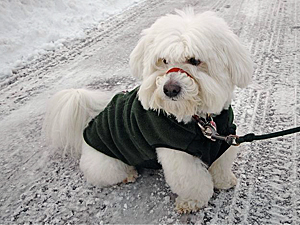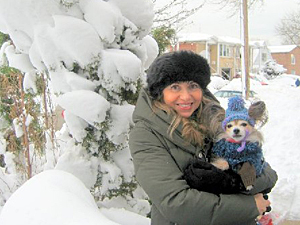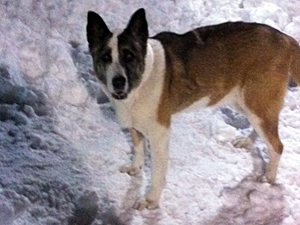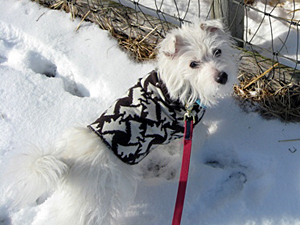
Even though they have their own fur coats, heavy sweaters or waterproof coats can help dogs stay warm and healthy during the winter months.
Photo by Eliot Tuckerman
Hot Tips for Caring for Your Pets in Cold Weather
People who don't like New York winters can just move to Florida. Or Arizona. Dogs and cats aren't so lucky. They're stuck here. So it's up to their owners to make winter more bearable for them.
Just because they're already wearing a fur coat doesn't mean they can't feel the cold. For dogs, this means being sure they have a heavy sweater or a coat with a warm lining and waterproof outer shell. That is, unless your dog is one of the breeds that thinks a blizzard is a preview of heaven — like a Samoyed, Malamute, Husky, Chow, or Akita.
Even dogs who like to spend their days outdoors in a fenced yard need shelter. That means an insulated dog house that's a few inches off the ground, has a sloping roof, and a door flap to keep out drafts. They'll also need dry bedding.
Dogs with less hair or body fat, like Greyhounds, Boxers, and Chihuahuas, probably shouldn't even stick their noses outdoors without a warm coat. The same goes for younger and older dogs.

Tiny dogs with low body fat, like Stella Panzarino's Chihuahua Chico, should not go outdoors in winter without a warm sweater — and even a hat!
Photo by Stella Panzarino
Heavier dogs can also have their own problems. Dr. Daniel Lauridia, Murray Hill Pet Hospital, says, "Be careful of dogs on ice, especially heavier breeds such as Labs. We see a lot of ACL (anterior cruciate ligament) ruptures in the knee during this weather from dogs slipping on ice."
Salted streets and sidewalks present another set of problems and dangers. If you're clever enough to get boots on Fido, that's great. Dr. Louise Murray, Director of Medicine of the ASPCA Bergh Memorial Animal Hospital, thinks, "Muttluks are a nice brand, and there are other good ones, too." Plan B involves using a small amount of petroleum jelly, olive oil, or, go for it — slather on Musher's Secret Paw Protector, the self-described "Invisible Dog Boots." Dr. Michael Marder of Westside Veterinary Center also recommends Musher's, but, he cautions, "It protects paws from frost and salt, but in NYC I worry about it staining carpets."
When your dog comes in from the cold, wipe everything off his or her paws that you don't want them to lick. And check to make sure there are no wounds or cuts that might require medical attention.
Dr. Lauridia warns dog owners of another outdoor danger, which can be hazardous any time of year: "Beware of the open light post covers. Do not allow your dog to sniff around the wires. Many dogs are electrocuted by loose wires." (To read more about the hazards of street shocks and how you can avoid them, check out StreetZaps.com.)

Some cold- and snow-loving breeds, such as Akitas like Moxy, may not need extra winter protection to stay warm in normal New York City winter conditions.
Photo by Katherine Warshaw-Reid
We can't say enough bad things about antifreeze. It's a big danger to any pet who gets outside and ingests it. Dr. Lauridia agrees. "Beware of green liquid on streets. This is most likely antifreeze, and dogs find it sweet to lick. Antifreeze can kill dogs by destroying their kidneys. Without medical treatment, your dog can be dead in less than a day." Dr. Murray shares that concern. "Don't even let your dog drink out of puddles," she warns.
Cold air can also cause your pet's skin to be itchy and flaky, so using a humidifier might help your dog's skin (as much as yours). Brushing can also improve their skin's condition as well as stimulating circulation and removing dead hair.
Frostbite is another concern. It happens when your dog is out in the cold for too long. So with shorthaired dogs, when it's below freezing, limit their time outdoors to a quick in and out. Longhaired dogs can stand the cold better, but they aren't immune to frostbite. Blue gums, breathing that sounds labored, and shivering are warning signs of hypothermia and mean you should bring them inside at once, warm them with a blanket, and get them to a vet as soon as possible. But the best way to deal with this problem is to avoid it completely. Dr. Lauridia advises, "I would take dogs out for only short periods, to stretch and relieve themselves, when weather is really bad (under 30 degrees F) — only a few minutes at a time."

With proper precautions, dogs like Doggy Moms star Cubby Searl can be safe and comfortable year-round.
Photo by Erika Searl
In the cold weather your pet burns more energy to keep warm, so he or she may need more food. Water is important, too, to keep him or her well-hydrated.
And don't even think of leaving your pet alone in a car in cold weather. Not even for a minute. Besides the danger of carbon monoxide, there's the possibility the engine will quit and your pet will freeze. Or car thieves will think a car with the engine running is too tempting to pass up.
Caring for cats in cold weather is much simpler. Keep them indoors — just as we hope you keep them indoors year-round.
But what about the colony of community (feral) cats you're caring for? Ashot Karamian, a volunteer with All About Spay Neuter and Urban Cat League, both Alliance Participating Organizations, says, "Feral cats need three things to live happy and long lives outdoors. Besides TNR (Trap-Neuter-Return) and nutritious food and water, they need shelter. And in severe cold weather, shelter is even more important than food and water." To read more about winter care for feral cats, including where you can acquire a winter shelter, visit the NYC Feral Cat Initiatve Feral Cat Colony Care page.
Providing for your pets' winter needs can help ensure that they have a safe and comfortable winter. And remember, blustery weather won't last forever. Check with Punxsutawney Phil on Groundhog Day, February 2, to find out how much longer winter will last!
 About the Author
About the Author
Jane Warshaw is a former advertising copywriter who is now a freelance writer specializing in animal rights, animal welfare, and human health and rights issues. Her work has appeared in Time Out New York, The Villager, HuffingtonPost.com, TheMorningLine.com, Tango.com, and the TimesLedger and Manhattan Media newspapers. A graduate of the University of Michigan in Ann Arbor, she now lives in New York City with three cats, a rescued racing Greyhound, and a rotating cast of foster cats and kittens who she cares for until they're healthy and happy enough to be adopted into permanent homes.






